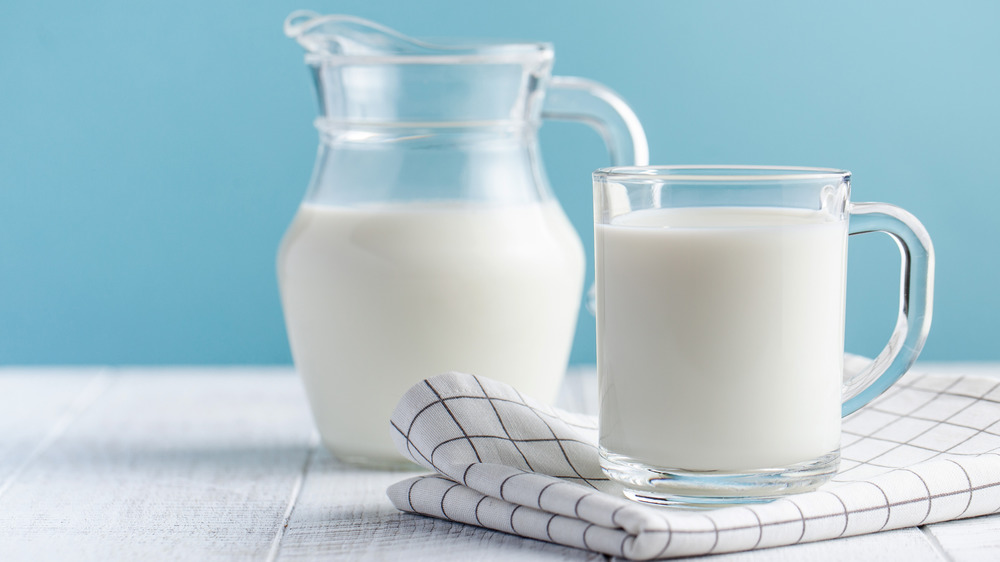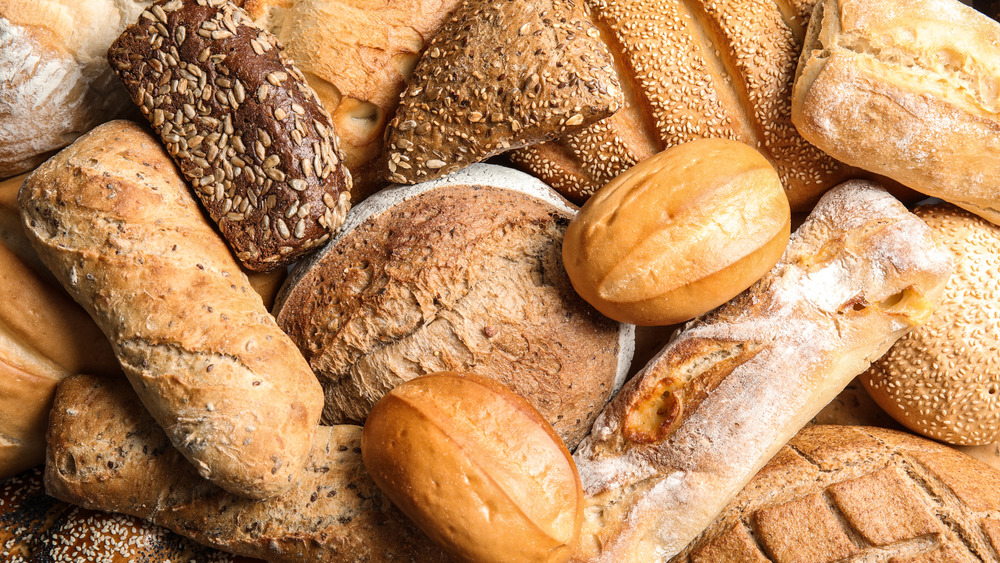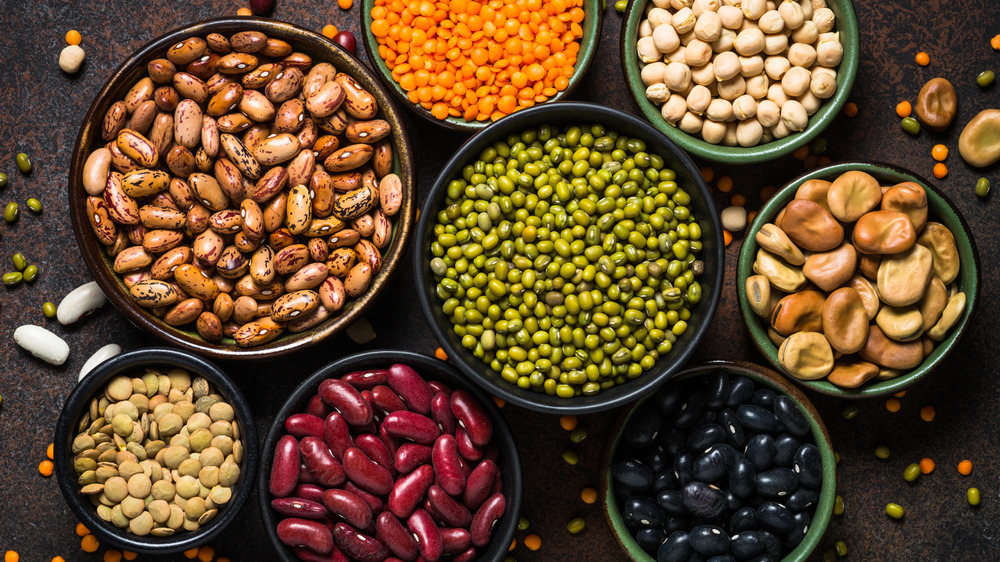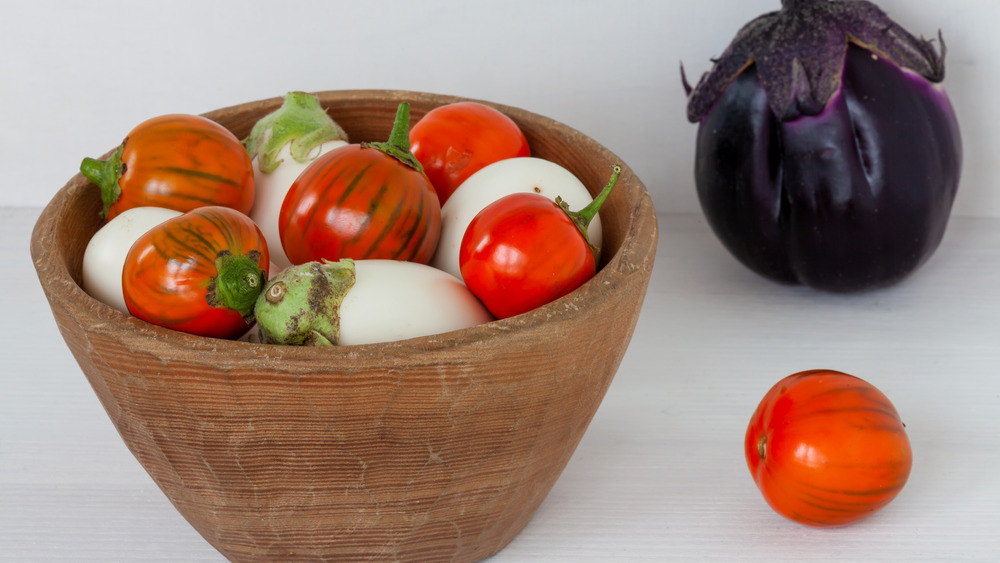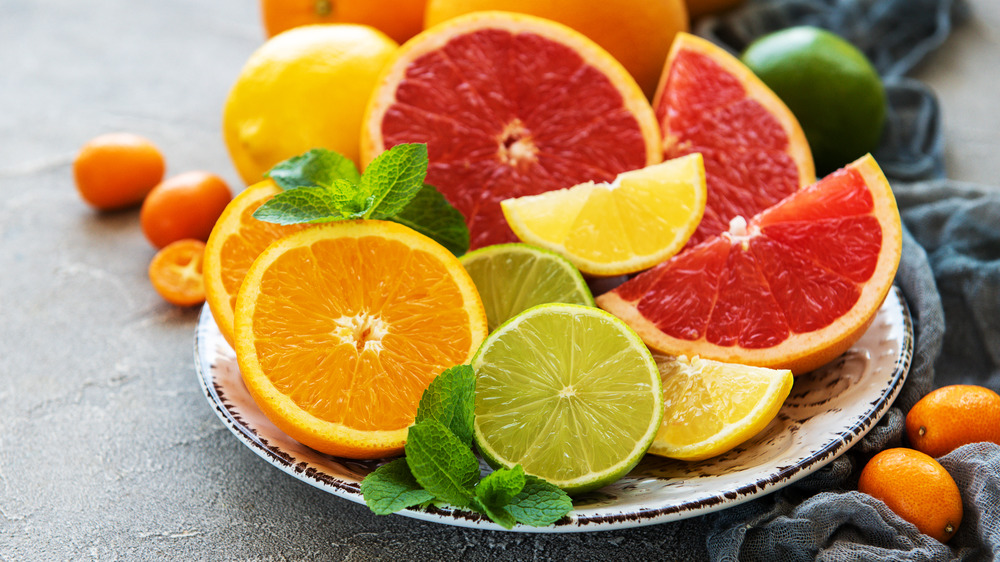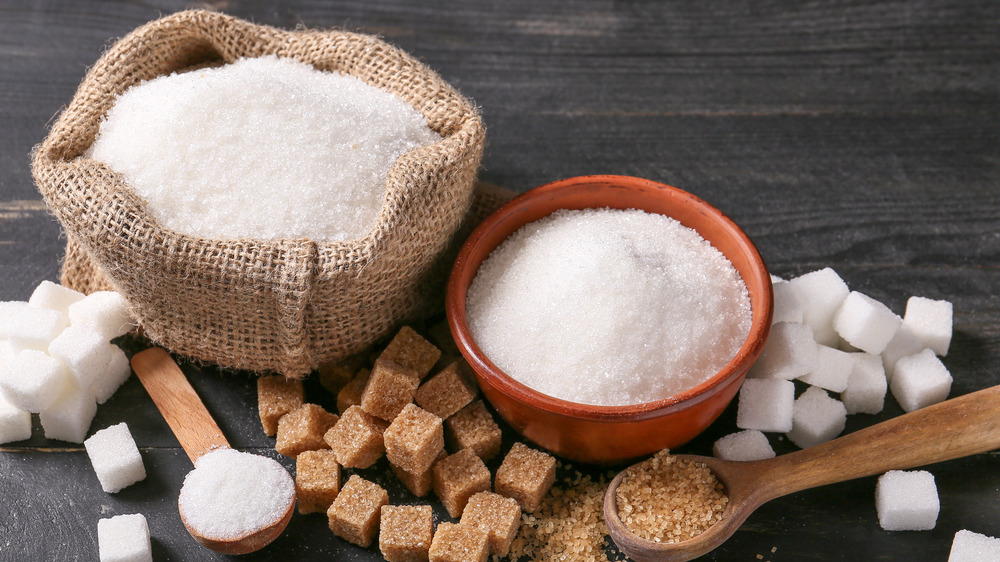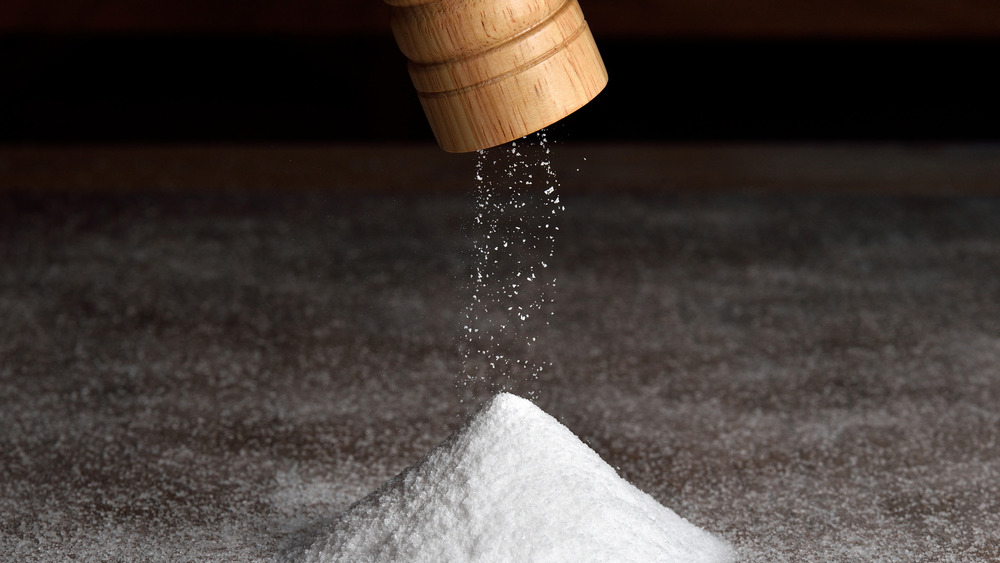Foods That Are Doing Serious Damage To Your Gut Health
"The human gut is home to a few trillion bacteria," Preeti Pusalkar, certified clinical nutritionist at Hudson Medical Wellness in New York City, told Health Digest. "Maintaining this flora is important for gut health." The Ancient Greek physician Hippocrates, credited for the quote and concept that "all disease begins in the gut," was certainly onto something. Many medical conditions are caused by, if not aggravated by, an unhealthy gut (via Healthline).
Studies have shown that less healthful foods disturb the balance in the flora, causing gastrointestinal problems or damage to gut bacteria, resulting in bloating, diarrhea or constipation (via Medical News Today). "A damaged gut can lead to many digestive health issues including irritable bowel syndrome (IBS), SIBO, Crohn's Disease, irregularity, stomach pain, bloating, and more," according to Pusalkar. "One of the best ways to support your gut health is to eat foods that promote overall gut health like prebiotic or probiotic rich foods, foods that are fermented and whole foods that are organically grown."
Wondering which foods you should limit? Here are some of the ones that are doing serious damage to your gut health.
Gluten can lead to leaky gut
There's a reason many Americans, not just those with celiac disease, are eliminating gluten from their diets. While most people can tolerate gluten with no ill effects, some without the disease may have non-celiac sensitivity. Symptoms include digestive pain and discomfort, bloating, and diarrhea. Gluten, the proteins found in wheat, rye, and barley, acts as a glue holding food together. Helpful, yes, but it can cause the body to create antibodies which increases inflammation — specifically in the intestinal system.
"Many research studies show that ingesting gluten can increase a protein called zonulin, which results in increased intestinal permeability (aka 'leaky gut')," Taylor Stolt, functional medicine registered dietitian, told Health Digest. But the problem with zonulin goes beyond digestive upset. "Zonulin damages intestinal tight junctions (the links between cells of the intestine to keep it from being too permeable)," Alicia Galvin, registered dietitian, told us.
Intestinal permeability, when healthy, allows nutrients to pass through for your body to use, which is one reason gut health is linked to our immunity, a report in BMC Gastroenterology revealed. But when unhealthy (e.g. cracked or punctured), that barrier can allow damaging toxins through. This damage has been linked beyond inflammation to autoimmune diseases, diseases of the nervous system, and even cancer, studies have found.
Dairy can cause inflammation in the gut
According to data shared by MedlinePlus, "Approximately 65 percent of the human population has a reduced ability to digest lactose after infancy." So whether you are lactose intolerant or lactose sensitive, dairy might be a problematic food for you and your gut health.
Our small intestines work to break down lactose, the sugar in milk. They do this by producing the enzyme lactase. If yours doesn't produce enough, you might have trouble digesting dairy products — signaled by painful or uncomfortable gas, cramps, and diarrhea. "I recommend people stay away from dairy, which is a mucus producer and leads to inflamed gut lining and 'leaky gut' for many people," Dr. Rahul Dixit, gastroenterologist and medical advisor of G-Plans, told Health Digest.
This nuance is debated in medical communities (via Harvard Health Blog). Animal proteins — inclusive of dairy, meat, and eggs — have been linked to inflammatory bowel disease, as one study showed. But the probiotics in dairy products, especially fermented dairy products, such as kefir, provide healing probiotics that actually strengthen our intestinal systems.
Artificial sweeteners reduce beneficial gut bacteria
Once touted as the answer to dieters' dreams and an option for those trying to reduce their intake of sugar, artificial sweeteners are unfortunately not good for your gut. Technically a food additive, artificial sweeteners are what they say they are — artificial.
"Artificial sweeteners have been shown to increase fecal pH, and reduce beneficial gut bacteria," Ella Davar, registered dietitian and holistic nutritionist, told Health Digest. "Research shows that the increase of fecal pH 6.6 was significantly associated with increased mortality and may be a risk factor for colon cancer," said Davar. "Altered gut flora is associated with complications such as metabolic and digestive issues, nutrient deficiencies, and inflammation."
According to Dr. Rahul Dixit, gastroenterologist and medical advisor of G-Plans, the artificial sweetener sorbital is particularly problematic — which is most unfortunate because it offers benefits for people suffering from diabetes (via Healthline). "I tell patients to stay away from artificial sugars ... which lead to significant gut flora dysregulation," Dr. Dixit told Health Digest.
Refined carbohydrates harm your gut health in several ways
Ah, carbs. Any pasta-, bagel-, or bread-loving individual knows they are hard to limit. Of course, there are "good" and "bad" carbohydrates (via WebMD). Those full of fiber are put to work in our systems; those that are refined are essentially processed and actually mitigate the good work of the fiber we consume.
"Refined carbohydrates like those found in sugar-laden foods such as pastries and convenience foods can trigger a state of inflammation in several ways," Trista Best, registered dietitian and consultant with Balance One Supplements, told Health Digest. "[They] cause a quick rise and fall in blood glucose which leads to mood and hormonal imbalance." You'll also find that these carbs leave you hungrier than healthy carbs.
Best further explained, "What we eat can either improve or harm our health in large and small ways, especially as it relates to gut health. This is particularly true for those foods we are seemingly addicted to, like processed convenience foods made from refined carbs."
Legumes aren't great for everyone's gut health
"Beans, beans, the musical fruit. The more you eat, the more you toot": You remember that little ditty from childhood, don't you? It's perhaps the reason why so many people grew up afraid to taste their mother's baked beans, no matter how good they smelled. If you don't have the enzymes to break beans down, you won't properly digest them.
"Beans are encumbered with healthy protein and fiber, but they also have stiffed or hard-to-digest sugars that cause bloating and cramping," Shannon Henry, registered dietitian at EZCare Clinic, told Health Digest. "Maybe your body doesn't have enzymes that can break them down. Bacteria in our gut do the work in its place, releasing gas in the process."
Beans aren't the only problematic legume. Peas and lentils can also be an issue. The lectins they contain are challenging for your digestive system to breakdown, according to Harvard's The Nutrition Source. They can damage your intestinal lining, cause inflammation, and subsequently inhibit your body's ability to absorb the nutrients they promise to deliver.
Processed foods can cause detrimental changes to your gut health
Linked to intestinal, systemic metabolic, and inflammatory diseases, the Western diet is laden with processed foods, a 2016 report in Molecular Metabolism explained. From the moment you wake up and have breakfast (think: breakfast cereals, instant oatmeal, or a side of bacon), to the time you eat lunch (sandwiches stuffed with deli meats), to snack time (granola bars, soda, cookies, or chips) to choosing what to have for dinner (frozen entrees, canned vegetables, refrigerated biscuits), you're likely eating many processed foods.
"Processed foods are linked to detrimental changes in composition of the gut microbiome (bacteria in the intestines), which may lead to diseases such as inflammatory bowel disease," Dr. Santosh Sanagapalli, a gastroenterologist, told Health Digest. These foods served an important purpose at the time they first flooded our markets — they increased shelf life. And additives to certain foods served to increase the nutritional value, providing a boost to otherwise malnourished individuals. However, according to a 2019 study in Nutrients, "Although some food additives can be beneficial for human health, others may alter the composition of the microbiota and lead to gut inflammation, which may promote diverse forms of inflammatory diseases."
Nightshade vegetables may be the reason for your leaky gut
Nightshade vegetables are loaded with nutritional value, but they can wreak havoc on some people's digestive systems. "Lectins in their active form can cause leaky gut," Preeti Pusalkar, certified clinical nutritionist at Hudson Medical Wellness in New York City, told Health Digest. "Some examples of foods that are high in lectin [include] nightshade vegetables like eggplant, potatoes, [and] tomatoes." Because of their lectin content, these yummy vegetables might be damaging to your gut, which may be expressed through bloating, irritable bowel syndrome, stomach pain, or other symptoms and conditions.
In addition to lectins, nightshade vegetables also contain alkaloids, which can be dangerous in large doses (via Cleveland Clinic). Some people question whether or not alkaloids can cause inflammation, but no studies have confirmed that link, as of this writing. Nevertheless, Pusalkar said, "One of the best ways to support your gut health is to eat foods that promote overall gut health like prebiotic- or probiotic-rich foods, foods that are fermented and whole foods that are organically grown."
Fried foods may lead to gut inflammation
Fried foods have a bad reputation — and for good reason. Over-consumption of fried foods can lead to obesity and heart disease and greater risk of mortality (via WebMD). Fried foods can also do serious damage to your gut health.
Brenda Braslow, registered dietitian nutritionist and certified diabetes educator, told Health Digest that fried foods take longer to digest compared to other foods. And this means they require more stomach acid, which leads to indigestion, according to Braslow. Fried foods are full of saturated fat, which presents another problem. "High saturated fat (mainly animal fat) intake has been shown to cause an imbalance of gut bacteria that can increase gut inflammation and disease," Braslow continued.
The alternative? "Having a high intake of fresh plant-based foods that offer vitamins, minerals, and antioxidants is important for a healthy gut," said Braslow. "Getting food sources of prebiotics, such as leafy greens, garlic, onions, leeks, artichokes, and bananas is important, along with probiotics in the form of yogurt, kefir, or buttermilk to keep the gut healthy."
Red meat and processed meats are especially harmful to your gut health
It's fairly common knowledge that eating red meat increases your risk of heart disease (via National Institutes of Health). A lesser known fact is that your gut plays a role in determining how eating red meat affects your body.
As it turns out, your gut produces more trimethylamine N-oxide, or TMAO, when it's been "fed" by a diet rich in red meat. And high levels of TMAO contribute to the development of artery-blocking plaque and elevates the risk of heart disease, according to Medical News Today. This happens because red meats contain a substance called choline. The bacteria in your gut feed on it, which is what produces TMAO, according to Harvard Women's Health Watch.
It's not just heart disease that you'll have to worry about on a carnivore diet — there are other implications for the digestive system. "Red meat and processed and preserved meats (e.g. salami and cured pork) have been linked to colorectal cancer," gastroenterologist Santosh Sanagapalli told Health Digest, "and the WHO has recently classified them as a carcinogen (cancer-causing substance)."
Citrus fruits can cause upset stomach
Gone are the days of scurvy outbreaks, when Vitamin C deficiencies were common and fresh produce was hard to come by (via Medical News Today). Today, the disease is rare thanks to enriched foods and multivitamins and the prevalence of wonderfully nutritious, naturally delicious citrus fruits. There has even been research into the health benefits of the citrus peel.
However, the same fruits we get so much value from can pose problems for your gut. "Citrus fruits are high in fiber, they can give a few people an upset stomach," Shannon Henry, registered dietitian at EZCare Clinic, told Health Digest.
Similarly, nutritionist Laura Flores told Live Science, "Eating too many oranges has some uncomfortable side effects. When [oranges are] eaten in excess, the greater fiber content can affect digestion, causing abdominal cramps, and could also lead to diarrhea." It's not just citrus fruits' fiber doing a number on your gut; they are acidic and can therefore irritate the linking of the stomach (via Everyday Health).
Too much sugar can wreak havoc on your gut health
We often link sugar and the bloodstream, but a connection begins in the gut — where sugar is digested, breaks down into glucose, and enters our bloodstream to provide us with the energy we need for all our functioning (via San Francisco Chronicle).
Although sugar is naturally in some foods, manufactured and processed foods often contain an excess amount. And issues arise when too much sugar is added to our foods. "High-sugar foods increase insulin levels which negatively impacts intestinal and digestive function," Alicia Galvin, registered dietitian, told Health Digest.
How? With any mention of insulin, we turn to the pancreas, an organ with a major role in our digestive system, though often taken for granted, according to Johns Hopkins Medicine. If you consume too much sugar, your pancreas might stop responding properly to insulin — and produce even more. Overworked, it could break down, which could lead to type 2 diabetes and heart disease (via WebMD).
Sodium can alter the healthy balance of gut bacteria
It's pretty well-known fact that for optimal health, people should avoid foods that are high in sodium, or salt, because of the negative impact it can have on the cardiovascular system (like heart disease and high blood pressure), according to The Nutrition Source. However, there are also consequences of a high-sodium diet for your gut.
"A high-salt diet has been linked with an increased risk of stomach cancer because it can damage the stomach lining and alter the healthy balance of gut bacteria," Brenda Braslow, registered dietitian and certified diabetes educator, told Health Digest.
A 2017 study of mice found that a high salt intake negatively impacts the gut microbiome by depleting lactobacillus – friendly bacteria and an aid for those suffering from diarrhea and other digestive ailments — which known to reduce inflammation. The study was later piloted with humans and showed a similar trend, connecting a high salt intake to the gut microbiome.
High-fructose corn syrup increases gut inflammation
High-fructose corn syrup (HFCS) is a liquid sugar alternative. It's derived from corn starch, a fine powder made by removing protein and fiber from corn, leaving only the starchy center (via Healthline). To make high-fructose corn syrup, manufacturers add enzymes to milled corn, converting glucose into fructose, creating a sweet syrup.
"[High-fructose corn syrup] has been found to increase inflammation in the body," Dr. Michael Jay Nusbaum, bariatric surgeon and weight loss expert, told Health Digest. "This increases your risk for obesity, diabetes, heart disease, and may actually be a reason why COVID is hitting us so much harder here in the USA. Since COVID involves an inflammatory cascade called the Cytokine Storm, the inflammation caused by obesity and a diet high in HFCS could very well be exacerbating the effects of the virus."
While the FDA approves the use of high-fructose corn syrup, dietary guidelines suggest limited use. But it's challenging to avoid completely, as it is found in many sodas, sweetened juices, processed sweets and fruits, crackers, condiments, nut butters, bread, and pre-packaged meals (via Medical News Today). "Unlike other countries, our food supply is riddled with HFCS," said Dr. Nusbaum. "In fact, up until recently, it was almost impossible to avoid it."
Alcohol can damage the lining of your gut
Alcohol isn't a food, we know. However, alcohol is a part of many people's diets and so potentially damaging to your gut if consumed to excess, we'd be remiss to leave it off this list.
A 2017 study published in Alcohol Research showed that large amounts of alcohol can overwhelm and damage both the gastrointestinal track and the liver. By damaging the lining of the gut, alcohol causes inflammation. An inflamed intestinal lining stops the gut from efficiently absorbing needed nutrients. And instead, they pass right through and leave the body as waste.
Alcohol also disturbs microbiota — the community of micro-organisms living in our guts that are key to many aspects of our health, including our immune and metabolic functioning. Furthermore, "Alcohol causes an increase in bacterial toxins called lipopolysaccharides, or LPS," Alicia Galvin, registered dietitian, told Health Digest. "These are very inflammatory molecules and can further damage GI tissue." Everything in moderation, right? Your gut depends on it.



